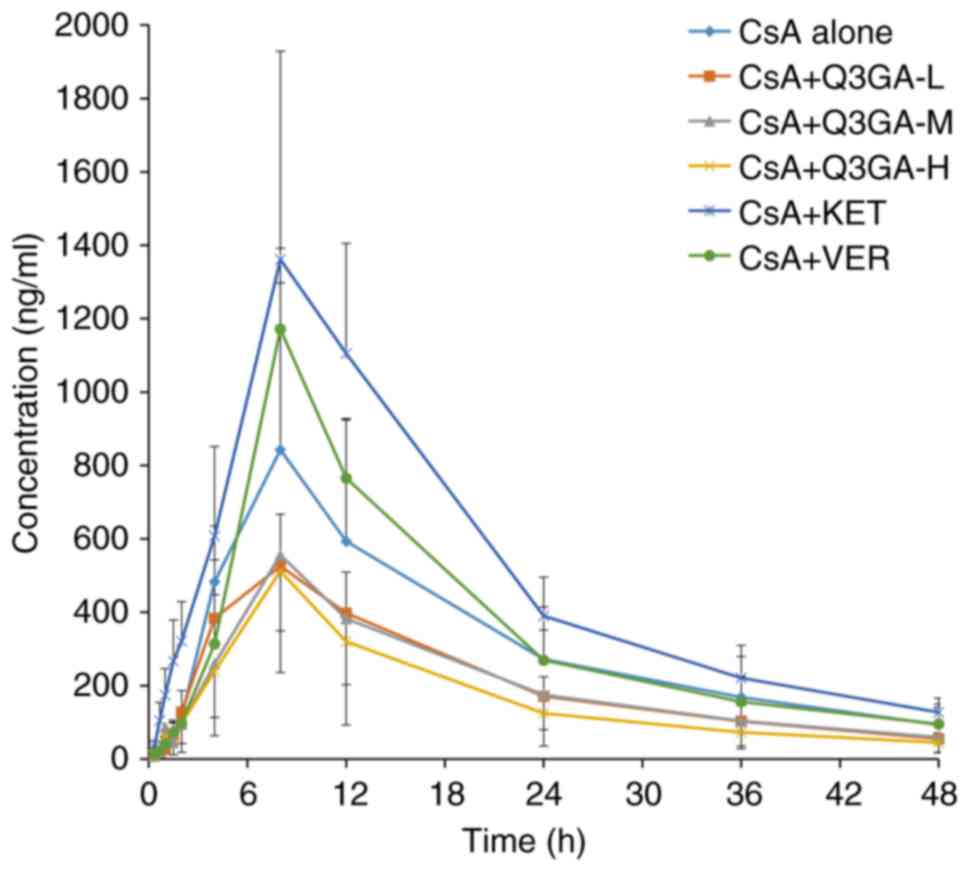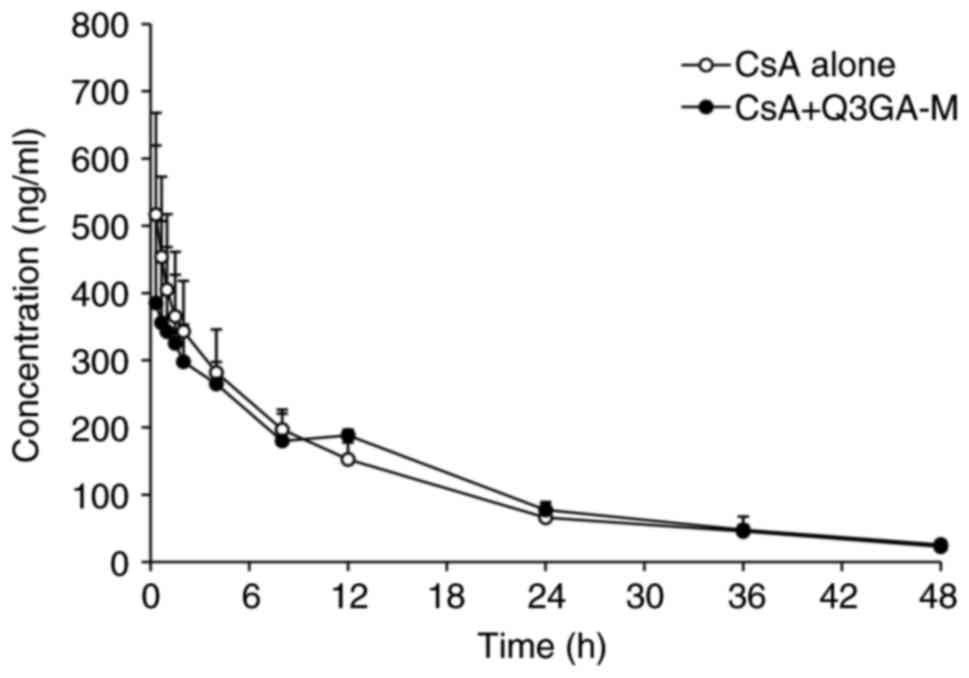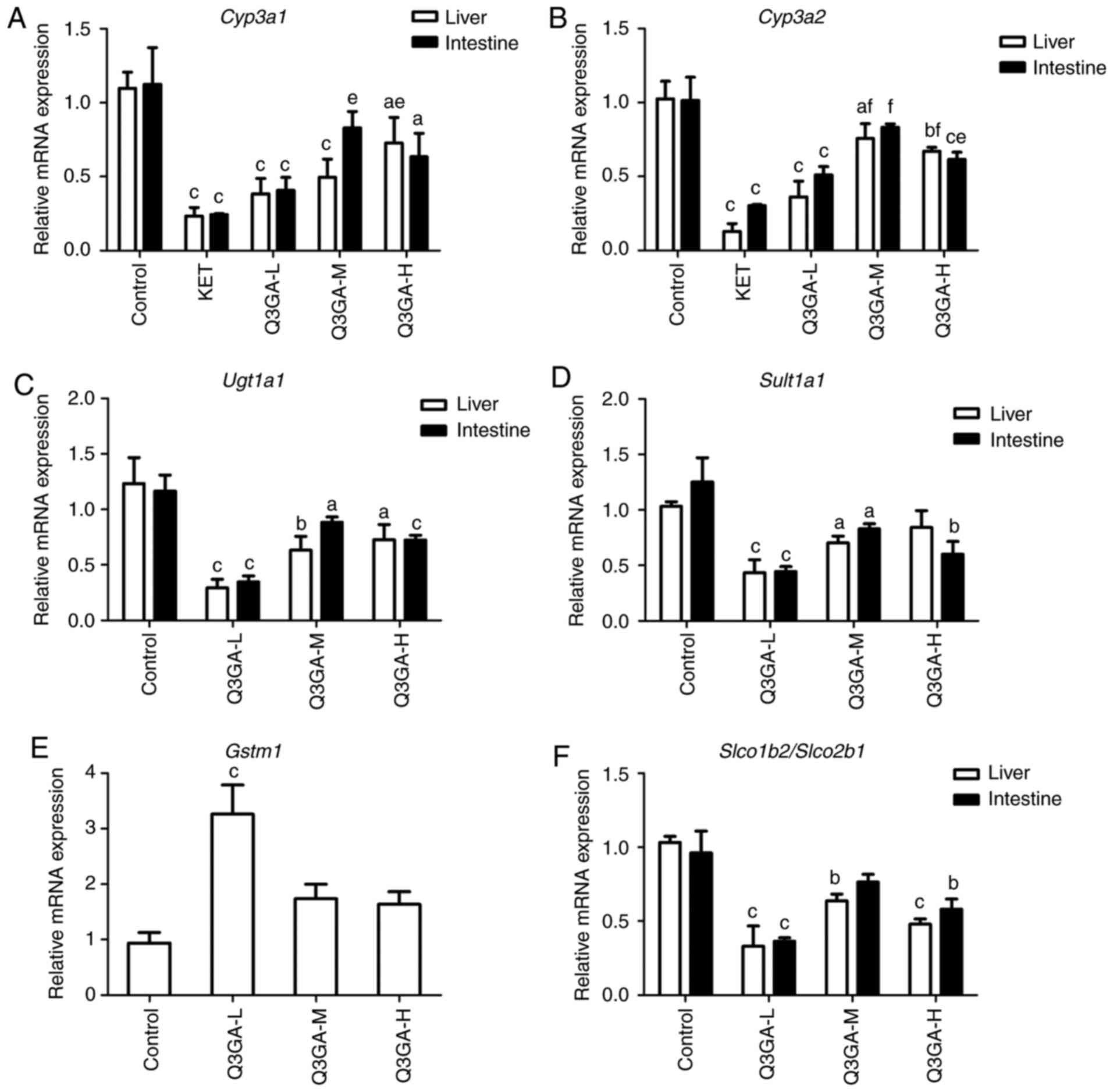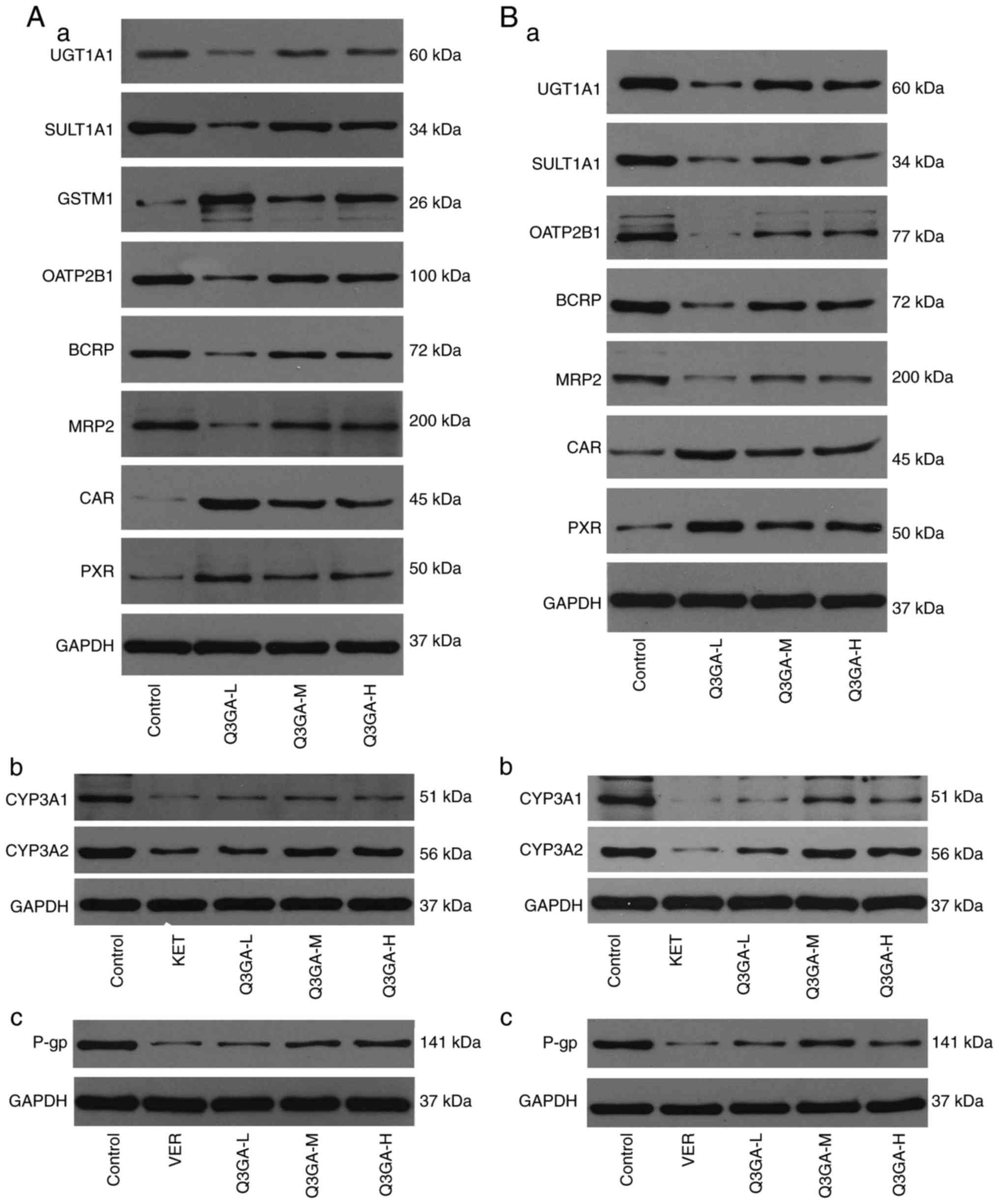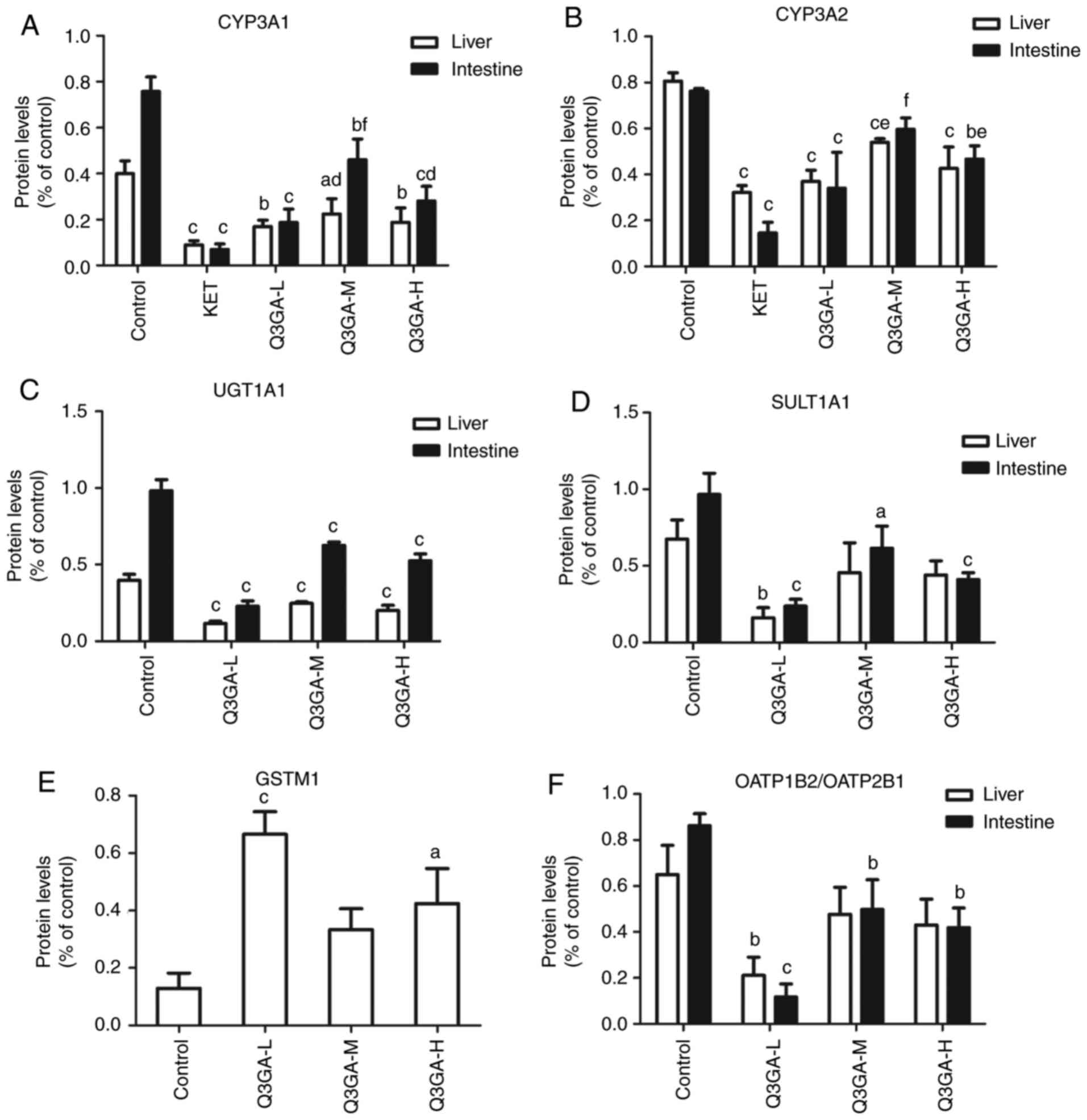|
1
|
Mlcek J, Jurikova T, Skrovankova S and
Sochor J: Quercetin and its anti-allergic immune response.
Molecules. 21:pii: E623. 2016. View Article : Google Scholar
|
|
2
|
Miclaus MO, Filip X, Filip C, Martin FA
and Grosu IG: Highly sensitive solid forms discrimination on the
whole tablet of the active ingredients in quercetin dietary
supplements by NMR crystallography approaches. J Pharm Biomed Anal.
124:274–280. 2016. View Article : Google Scholar : PubMed/NCBI
|
|
3
|
Manach C, Scalbert A, Morand C, Rémésy C
and Jiménez L: Polyphenols: Food sources and bioavailability. Am J
Clin Nutr. 79:727–747. 2004. View Article : Google Scholar : PubMed/NCBI
|
|
4
|
Cai X, Fang Z, Dou J, Yu A and Zhai G:
Bioavailability of quercetin: Problems and promises. Curr Med Chem.
20:2572–2582. 2013. View Article : Google Scholar : PubMed/NCBI
|
|
5
|
Russo M, Spagnuolo C, Tedesco I, Bilotto S
and Russo GL: The flavonoid quercetin in disease prevention and
therapy: Facts and fancies. Biochem Pharmacol. 83:6–15. 2012.
View Article : Google Scholar : PubMed/NCBI
|
|
6
|
Yang F, Song L, Wang H, Wang J, Xu Z and
Xing N: Quercetin in prostate cancer: Chemotherapeutic and
chemopreventive effects, mechanisms and clinical application
potential (Review). Oncol Rep. 33:2659–2668. 2015. View Article : Google Scholar : PubMed/NCBI
|
|
7
|
Kawabata K, Mukai R and Ishisaka A:
Quercetin and related polyphenols: New insights and implications
for their bioactivity and bioavailability. Food Funct. 6:1399–1417.
2015. View Article : Google Scholar : PubMed/NCBI
|
|
8
|
Galindo P, Rodriguez-Gómez I,
González-Manzano S, Dueñas M, Jiménez R, Menéndez C, Vargas F,
Tamargo J, Santos-Buelga C, Pérez-Vizcaíno F and Duarte J:
Glucuronidated quercetin lowers blood pressure in spontaneously
hypertensive rats via deconjugation. PLoS One. 7:e326732012.
View Article : Google Scholar : PubMed/NCBI
|
|
9
|
Ishizawa K, Yoshizumi M, Kawai Y, Terao J,
Kihira Y, Ikeda Y, Tomita S, Minakuchi K, Tsuchiya K and Tamaki T:
Pharmacology in health food: Metabolism of quercetin in vivo and
its protective effect against arteriosclerosis. J Pharmacol Sci.
115:466–470. 2011. View Article : Google Scholar : PubMed/NCBI
|
|
10
|
Fan D, Zhou X, Zhao C, Chen H, Zhao Y and
Gong X: Anti-inflammatory, antiviral and quantitative study of
quercetin-3-O-β-D-glucuronide in polygonum perfoliatum L.
Fitoterapia. 82:805–810. 2011. View Article : Google Scholar : PubMed/NCBI
|
|
11
|
Yokoyama A, Sakakibara H, Crozier A, Kawai
Y, Matsui A, Terao J, Kumazawa S and Shimoi K: Quercetin
metabolites and protection against peroxynitrite-induced oxidative
hepatic injury in rats. Free Radic Res. 43:913–921. 2009.
View Article : Google Scholar : PubMed/NCBI
|
|
12
|
Derlindati E, Dall'Asta M, Ardigò D,
Brighenti F, Zavaroni I, Crozier A and Del Rio D:
Quercetin-3-O-glucuronide affects the gene expression profile of M1
and M2a human macrophages exhibiting anti-inflammatory effects.
Food Funct. 3:1144–1152. 2012. View Article : Google Scholar : PubMed/NCBI
|
|
13
|
Arinç E, Yilmaz D and Bozcaarmutlu A:
Mechanism of inhibition of CYP1A1 and glutathione S-transferase
activities in fish liver by quercetin, resveratrol, naringenin,
hesperidin, and rutin. Nutr Cancer. 67:137–144. 2015. View Article : Google Scholar : PubMed/NCBI
|
|
14
|
Rastogi H and Jana S: Evaluation of
inhibitory effects of caffeic acid and quercetin on human liver
cytochrome p450 activities. Phytother Res. 28:1873–1878. 2014.
View Article : Google Scholar : PubMed/NCBI
|
|
15
|
Stachel N and Skopp G: Formation and
inhibition of ethyl glucuronide and ethyl sulfate. Forensic Sci
Int. 265:61–64. 2016. View Article : Google Scholar : PubMed/NCBI
|
|
16
|
Li Y, Revalde J and Paxton JW: The effects
of dietary and herbal phytochemicals on drug transporters. Adv Drug
Deliv Rev. 116:45–62. 2017. View Article : Google Scholar : PubMed/NCBI
|
|
17
|
Shi M, Liu Y, Bian JL, Jin M and Gui CS:
The interactions between natural products and OATP1B1. Yao Xue Xue
Bao. 50:848–853. 2015.(In Chinese). PubMed/NCBI
|
|
18
|
Li L, Stanton JD, Tolson AH, Luo Y and
Wang H: Bioactive terpenoids and flavonoids from Ginkgo biloba
extract induce the expression of hepatic drug-metabolizing enzymes
through pregnane X receptor, constitutive androstane receptor, and
aryl hydrocarbon receptor-mediated pathways. Pharm Res. 26:872–882.
2009. View Article : Google Scholar : PubMed/NCBI
|
|
19
|
Tolson AH and Wang H: Regulation of
drug-metabolizing enzymes by xenobiotic receptors: PXR and CAR. Adv
Drug Deliv Rev. 62:1238–1249. 2010. View Article : Google Scholar : PubMed/NCBI
|
|
20
|
Chang YZ, Lin HC, Chan ST and Yeh SL:
Effects of quercetin metabolites on the enhancing effect of
β-carotene on DNA damage and cytochrome P1A1/2 expression in
benzo[a]pyrene-exposed A549 cells. Food Chem. 133:445–450. 2012.
View Article : Google Scholar : PubMed/NCBI
|
|
21
|
Yu CP, Lin HJ, Lin SP, Shia CS, Chang PH,
Hou YC and Hsieh YW: Rhubarb decreased the systemic exposure of
cyclosporine, a probe substrate of P-glycoprotein and CYP 3A.
Xenobiotica. 46:677–682. 2016. View Article : Google Scholar : PubMed/NCBI
|
|
22
|
Dupuis R, Yuen A and Innocenti F: The
influence of UGT polymorphisms as biomarkers in solid organ
transplantation. Clin Chim Acta. 413:1318–1325. 2012. View Article : Google Scholar : PubMed/NCBI
|
|
23
|
Kato R, Nishide M, Kozu C, Iwamoto A,
Urashima K, Suzuki K, Ijiri Y, Hayashi T and Tanaka K: Is
cyclosporine a transport inhibited by pravastatin via multidrug
resistant protein 2? Eur J Clin Pharmacol. 66:153–158. 2010.
View Article : Google Scholar : PubMed/NCBI
|
|
24
|
Ouwerkerk-Mahadevan S, Snoeys J, Peeters
M, Beumont-Mauviel M and Simion A: Drug-drug interactions with the
NS3/4A protease inhibitor simeprevir. Clin Pharmacokinet.
55:197–208. 2016. View Article : Google Scholar : PubMed/NCBI
|
|
25
|
Fu J, Tjandra M, Becker C, Bednarczyk D,
Capparelli M, Elling R, Hanna I, Fujimoto R, Furegati M, Karur S,
et al: Potent nonimmunosuppressive cyclophilin inhibitors with
improved pharmaceutical properties and decreased transporter
inhibition. J Med Chem. 57:8503–8516. 2014. View Article : Google Scholar : PubMed/NCBI
|
|
26
|
Choi JS, Choi BC and Choi KE: Effect of
quercetin on the pharmacokinetics of oral cyclosporine. Am J Health
Syst Pharm. 61:2406–2409. 2004.PubMed/NCBI
|
|
27
|
Zal F, Mostafavi-Pour Z and Vessal M:
Comparison of the effects of vitamin E and/or quercetin in
attenuating chronic cyclosporine A-induced nephrotoxicity in male
rats. Clin Exp Pharmacol Physiol. 34:720–724. 2007. View Article : Google Scholar : PubMed/NCBI
|
|
28
|
Liu Y, Luo X, Yang C, Yang T, Zhou J and
Shi S: Impact of quercetin-induced changes in drug-metabolizing
enzyme and transporter expression on the pharmacokinetics of
cyclosporine in rats. Mol Med Rep. 14:3073–3085. 2016. View Article : Google Scholar : PubMed/NCBI
|
|
29
|
Chiou WL: Critical evaluation of the
potential error in pharmacokinetic studies of using the linear
trapezoidal rule method for the calculation of the area under the
plasma level-time curve. J Pharmacokinet Biopharm. 6:539–546. 1978.
View Article : Google Scholar : PubMed/NCBI
|
|
30
|
Livak KJ and Schmittgen TD: Analysis of
relative gene expression data using real-time quantitative PCR and
the 2(-Delta Delta C(T)) method. Methods. 25:402–408. 2001.
View Article : Google Scholar : PubMed/NCBI
|
|
31
|
Lai Q, Wei J, Mahmoodurrahman M, Zhang C,
Quan S, Li T and Yu Y: Pharmacokinetic and nephroprotective
benefits of using Schisandra chinensis extracts in a cyclosporine
A-based immune-suppressive regime. Drug Des Devel Ther.
9:4997–5018. 2015.PubMed/NCBI
|
|
32
|
Zhu H, Zhu SC, Shakya S, Mao Q, Ding CH,
Long MH and Li SL: Study on the pharmacokinetics profiles of
polyphyllin I and its bioavailability enhancement through
co-administration with P-glycoprotein inhibitors by LC-MS/MS
method. J Pharm Biomed Anal. 107:119–124. 2015. View Article : Google Scholar : PubMed/NCBI
|
|
33
|
Yu CP, Wu PP, Hou YC, Lin SP, Tsai SY,
Chen CT and Chao PD: Quercetin and rutin reduced the
bioavailability of cyclosporine from Neoral, an immunosuppressant,
through activating P-glycoprotein and CYP 3A4. J Agric Food Chem.
59:4644–4648. 2011. View Article : Google Scholar : PubMed/NCBI
|
|
34
|
Shi S and Klotz U: Drug interactions with
herbal medicines. Clin Pharmacokinet. 51:77–104. 2012. View Article : Google Scholar : PubMed/NCBI
|
|
35
|
Li L, Yao QQ, Xu SY, Hu HH, Shen Q, Tian
Y, Pan LY, Zhou H, Jiang HD, Lu C, et al: Cyclosporin A affects the
bioavailability of ginkgolic acids via inhibition of P-gp and BCRP.
Eur J Pharm Biopharm. 88:759–767. 2014. View Article : Google Scholar : PubMed/NCBI
|
|
36
|
Hsu PW, Shia CS, Lin SP, Chao PD, Juang SH
and Hou YC: Potential risk of mulberry-drug interaction: Modulation
on P-glycoprotein and cytochrome P450 3A. J Agric Food Chem.
61:4464–4469. 2013. View Article : Google Scholar : PubMed/NCBI
|
|
37
|
Hsiu SL, Hou YC, Wang YH, Tsao CW, Su SF
and Chao PD: Quercetin significantly decreased cyclosporin oral
bioavailability in pigs and rats. Life Sci. 72:227–235. 2002.
View Article : Google Scholar : PubMed/NCBI
|
|
38
|
Jiang W and Hu M: Mutual interactions
between flavonoids and enzymatic and transporter elements
responsible for flavonoid disposition via phase II metabolic
pathways. RSC Adv. 2:7948–7963. 2012. View Article : Google Scholar : PubMed/NCBI
|
|
39
|
Dong H, Lin W, Wu J and Chen T: Flavonoids
activate pregnane × receptor-mediated CYP3A4 gene expression by
inhibiting cyclin-dependent kinases in HepG2 liver carcinoma cells.
BMC Biochem. 11:232010. View Article : Google Scholar : PubMed/NCBI
|
|
40
|
Satsu H, Hiura Y, Mochizuki K, Hamada M
and Shimizu M: Activation of pregnane X receptor and induction of
MDR1 by dietary phytochemicals. J Agric Food Chem. 56:5366–5373.
2008. View Article : Google Scholar : PubMed/NCBI
|
|
41
|
Urquhart BL, Tirona RG and Kim RB: Nuclear
receptors and the regulation of drug-metabolizing enzymes and drug
transporters: Implications for interindividual variability in
response to drugs. J Clin Pharmacol. 47:566–578. 2007. View Article : Google Scholar : PubMed/NCBI
|
|
42
|
Lau AJ and Chang TK: 3-Hydroxyflavone and
structural analogues differentially activate pregnane X receptor:
Implication for inflammatory bowel disease. Pharmacol Res.
100:64–72. 2015. View Article : Google Scholar : PubMed/NCBI
|
|
43
|
Benet LZ, Cummins CL and Wu CY:
Transporter-enzyme interactions: Implications for predicting
drug-drug interactions from in vitro data. Curr Drug Metab.
4:393–398. 2003. View Article : Google Scholar : PubMed/NCBI
|
|
44
|
Benet LZ, Cummins CL and Wu CY: Unmasking
the dynamic interplay between efflux transporters and metabolic
enzymes. Int J Pharm. 277:3–9. 2004. View Article : Google Scholar : PubMed/NCBI
|
|
45
|
Shi S and Li Y: Interplay of
drug-metabolizing enzymes and transporters in drug absorption and
disposition. Curr Drug Metab. 15:915–941. 2014. View Article : Google Scholar : PubMed/NCBI
|
|
46
|
Li Y, Zhou J, Ramsden D, Taub ME, O'Brien
D, Xu J, Busacca CA, Gonnella N and Tweedie DJ: Enzyme-transporter
interplay in the formation and clearance of abundant metabolites of
faldaprevir found in excreta but not in circulation. Drug Metab
Dispos. 42:384–393. 2014. View Article : Google Scholar : PubMed/NCBI
|
|
47
|
Jiang W, Xu B, Wu B, Yu R and Hu M:
UDP-glucuronosyltransferase (UGT) 1A9-overexpressing HeLa cells is
an appropriate tool to delineate the kinetic interplay between
breast cancer resistance protein (BRCP) and UGT and to rapidly
identify the glucuronide substrates of BCRP. Drug Metab Dispos.
40:336–345. 2012. View Article : Google Scholar : PubMed/NCBI
|
|
48
|
van Zanden JJ, van der Woude H, Vaessen J,
Usta M, Wortelboer HM, Cnubben NH and Rietjens IM: The effect of
quercetin phase II metabolism on its MRP1 and MRP2 inhibiting
potential. Biochem Pharmacol. 74:345–351. 2007. View Article : Google Scholar : PubMed/NCBI
|
|
49
|
Wong CC and Williamson G: Inhibition of
hydroxycinnamic acid sulfation by flavonoids and their conjugated
metabolites. Biofactors. 39:644–651. 2013. View Article : Google Scholar : PubMed/NCBI
|















